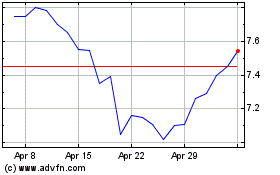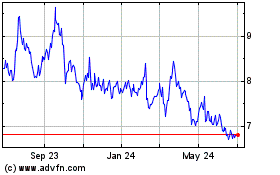Auto maker explores sale of Opel business to France's Peugeot as
it focuses on profit
By Mike Colias and Nick Kostov
General Motors Co. is weighing a sale of its beleaguered Opel AG
unit to French car maker Peugeot, a bold retreat by Chief Executive
Mary Barra from the European market and a firm reversal of the
megavolume strategy that guided the auto giant for decades.
The Detroit auto maker said Tuesday it is discussing its
existing partnership with Peugeot, including a possible sale of a
business that hasn't turned a profit this century. Ms. Barra has
been dismantling unprofitable operations in recent years, including
abandoning Russia and certain Asian markets. A sale of Opel would
essentially end the company's business in the world's third-largest
automobile market.
Shedding Opel would reduce GM's volume by 10% and knock the No.1
U.S. auto maker out of the chase to be the top seller globally, a
spot it owned until recently.
A sale likely would boost margins and free up money for
improving its position in more profitable markets and pursuing
future technologies, such as self-driving cars.
Auto executives have generally held that adding business breadth
through consolidation could help them better allocate capital. But
Ms. Barra has said margins outweigh market share and -- unlike many
of her peers -- has shunted growth opportunities when the business
case is murky.
If Peugeot, known formally as Groupe PSA SA, acquires Opel and
its U.K. division Vauxhall, it would emerge as Europe's No. 2 car
maker. GM is looking for a multibillion-dollar amount for the Opel
brand, but discussions could still fall apart, people familiar with
the matter said.
The development comes in the wake of GM's commitment to add more
than $1 billion to its planned investments in the U.S. Executives
in the domestic auto industry have faced criticism from President
Donald Trump on Mexico imports, but are optimistic about his
proposals regarding tax reform and regulatory relief.
GM and Peugeot have worked together since forging an alliance in
February 2012 to co-develop vehicle platforms and purchase vehicle
components. GM bought a 7% stake in Peugeot for $400 million in
2012, but sold its stake the following year.
Work continued behind the scenes as both auto makers recovered
from the eurozone crisis and a six-year slide for the region's auto
market. Formal talks about a deeper alliance began last spring and
eventually included the prospect of an Opel acquisition, according
to two people familiar with the matter.
Ms. Barra has achieved a number of financial targets, but
stanching Europe's red ink eluded her. A $300 million currency
headwind unleashed by the U.K.'s 2016 vote to leave the European
Union led to losses last year, even as the company reported $12
billion in North American profit.
Abandoning Opel would leave GM as the only top-tier auto maker
without a substantial presence in Europe. Ford Motor Co. and Fiat
Chrysler Automobiles NV make money in the region, although those
margins are dwarfed by profit earned in a North America where
pickup trucks and sport-utility vehicles offer disproportionate
returns.
GM will "fish where the fish are, or do business where the money
is," GM President Dan Ammann recently told analysts.
The company is also investing more in its aftermarket parts
business and lending arm and in China.
Analysts said an Opel sale would improve GM's bottom line and
cash flow. GM shares on Tuesday rose 4.8% in New York, while PSA
gained 4.3% in Paris trading.
Adding Opel could help Peugeot, which owns the Citroën brand,
create a more balanced geographic footprint and would boost volume
by one million vehicles, or about a third. Opel is stronger in its
home market of Germany and the U.K., while Peugeot is strongest in
France and Southern Europe.
One of the developments prodding GM executives to consider
ditching Opel is the tougher oversight on emissions performance
amid Volkswagen AG's diesel scandal. Tougher standards could hasten
a transition toward electrification as a dominant auto technology
in Europe, adding significant cost.
Opel has racked up $15 billion in losses over the past decade
and a half. GM came close to selling the unit in 2009 to Canadian
auto supplier Magna International Inc. but backed away over
concerns it would be underrepresented in Europe.
An agreement to combine Peugeot and Opel is likely to face tough
scrutiny in Paris and Berlin, because both auto makers employ tens
of thousands of people in their domestic markets.
The French government holds a 14% stake in Peugeot, as do the
Peugeot family and Chinese firm Dongfeng Motor Group.
Together Opel and Peugeot would command nearly 17% of the
European market, allowing the French firm to leapfrog domestic
rival Renault SA and become the biggest participant on the
continent after world leader Volkswagen.
Opel employs 34,500 people in Europe, with more than 16,500 in
Germany. Peugeot employs 184,000 world-wide.
Opel's works council and labor union IG Metall said they were
surprised by "rumors about a possible sale of Opel/Vauxhall to
PSA," describing any talks as "an unprecedented infringement of all
German and European rights of co-determination." Government
officials in Germany also expressed concern over the potential
impact on jobs.
Ms. Barra's apparent decision to retrench runs counter to peers
espousing consolidation.
Carlos Ghosn, heading Renault's alliance with Nissan Motor Co.,
has been chasing scale, even if it means taking on troubled
operations. The alliance purchased a controlling stake in
Mitsubishi Motors Corp., helping it vault into the industry's top
ranks for sales.
Fiat Chrysler Automobiles NV Chief Executive Sergio Marchionne
reached out to Ms. Barra in recent years for a merger, arguing auto
makers needed to be much bigger in order to better use capital. He
was rebuffed.
It would be unconventional for GM to abandon Europe, where 15.1
million vehicles were sold last year, said Warren Browne, an
independent auto consultant. Mr. Browne, a former GM executive who
ran its Russian operations before retiring in 2009, said GM would
be walking away from growth potential from Eastern Europe. "Europe
is a mature market, but other players are making money there," he
said. "I don't see how you walk away and still be considered a
global player."
Write to Mike Colias at Mike.Colias@wsj.com and Nick Kostov at
Nick.Kostov@wsj.com
(END) Dow Jones Newswires
February 15, 2017 02:47 ET (07:47 GMT)
Copyright (c) 2017 Dow Jones & Company, Inc.
Nissan Motor (PK) (USOTC:NSANY)
Historical Stock Chart
From Oct 2024 to Nov 2024

Nissan Motor (PK) (USOTC:NSANY)
Historical Stock Chart
From Nov 2023 to Nov 2024
